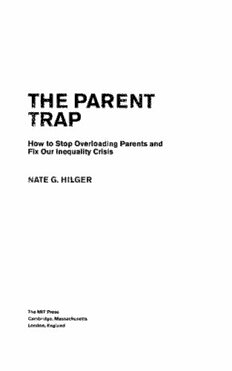
The Parent Trap: How to Stop Overloading Parents and Fix Our Inequality Crisis PDF
Preview The Parent Trap: How to Stop Overloading Parents and Fix Our Inequality Crisis
How to Stop Overloading Parents and Fix Our Inequality Crisis NATE G. HILGER The MIT Press Cambridge, Massachusetts London, England © 2022 Nate G. Hilger All rights reserved. No part of this book may be reproduced in any form by any electronic or mechanical means (including photocopying, recording, or information storage and retrieval) without permission in writing from the publisher. The MIT Press would like to thank the anonymous peer reviewers who provided comments on drafts of this book. The generous work of academic experts is essential for establishing the authority and quality of our publications. We acknowledge with gratitude the contribu- tions of these otherwise uncredited readers. This book was set in Adobe Garamond Pro by New Best-set Typesetters Ltd. Printed and bound in the United States of America. Library of Congress Cataloging-in-Publication Data Names: Hilger, Nate G., author. Title: The parent trap : how to stop overloading parents and fix our inequality crisis / Nate G. Hilger. Description: Cambridge, Massachusetts : The MIT Press, 2022. | Includes bibliographical references and index. Identifiers: LCCN 2021033955 | ISBN 9780262046688 (hardcover) Subjects: LCSH: Child rearing—United States. | Parent and child—United States. | Child care—United States. Classification: LCC HQ769 .H5585 2022 | DDC 649/.1—dc23 LC record available at https://Iccn.loc.gov/2021033955 10 9 8 7 6 5 4 3 2 «1 To my parents, Judith and Christopher, my wife, Bao, and our son, Felix. Contents INTRODUCTION / 1 AN ALTERNATE REALITY 2/ 2 WHAT PARENTS REALLY DO 57 3 TEACHING OLD PARENTS NEW TRICKS 85 4 WHY PARENTS CAN’T BUILD SKILLS ON THEIR OWN /// 5 SKILL DEVELOPMENT AND RACIAL INEQUALITY 733 6 GETTING MORE BY ASKING FORLESS 1/65 7 WHY WE DON’T INVEST IN SKILL DEVELOPMENT /89 Appendix 2/5 Acknowledgments 225 Notes 227 Index 287 INTRODUCTION Over the past 20 years, many industries have spent a great deal of money on lobbying to support their economic interests. The US Chamber of Commerce spent $1.5 billion to support business interests. Unions spent $700 million to back fabor interests. Real estate, health, pharmaceutical, aviation, and petroleum companies together spent more than $3 billion. The American Association of Retired People (AARP) spent $300 million to support elderly people’s interests.’ ‘There is one major industry that is not on this list. By many measures, it is the largest industry in the country. Given its failure to lobby, the indus- try receives little political support. Its many workers toil in isolation, with- out recognition or compensation. Their backbreaking labor is not counted in any official statistics, as if it were secret or illegitimate. The industry has no centralized organization representing its interests. Relative to its size, it spends almost nothing on research and development to improve operations over time. The industry shuffles along at a fraction of its potential capacity, its participants underutilized, inefficient, overwhelmed. What is this monumental ghost industry? Parenting. THE TWO SIDES OF PARENTING We dont often think of parenting as an “industry” or of parents as “work- ers, and for good reason. Parents volunteer for the job. They want te do it, and they’re more than happy to do it for free. In many ways, parenting is no more a “job” than loving or living. But just because love moves people to do a job for free doesn’t mean their work isn't producing something of enormous cultural and economic value. And it is production of that value that can usefully be thought of, in some respects, as a major industry. Every year American parents provide full-time, overtime, comprehen- sive child-development services to Americas 74 million children. If we value these services at market rate—what it would take to buy the most comparable services we can find for money—they sum to more than $5 trillion of output every year.” Valued in this way, parenting emerges as the largest industry in the United States, easily beating out health care in sec- ond place at less than $4 trillion. So let’s step back for a moment and see what happens if we view parents as members of a (very) important indus- try. In this capacity, parents have two main kinds of responsibilities. One of these responsibilities is to care for children. Caring is the more personal side of parenting. In this role, parents do their best to love chil- dren, protect them, provide for them, bring them joy, and comfort them against life's many slings and arrows. In their caring role, parents also pass along cherished cultural practices, rituals, and faiths to enrich their chil- dren’s lives. The second responsibility of parents is to build skills in children. This is the more professional side of parenting. In this role, parents manage complex investments in all aspects of children’s skill growth. Skills go far beyond “book smarts” such as math and reading. They include general skills such as strength and dexterity, confidence and wit, tenacity and disci- pline. They also include more specific skills, such as how to play football or tennis, chess or guitar, how to fix a flat tire or build a campfire. These and so many other skills equip children to flourish independently in adulthood. As a form of wealth, skills are “assets.” All assets yield a ow of economic value to their owners over time. Stocks, for example, yield dividends and capital gains. Real estate yields rents. Cars yield transportation services. Skills yield value in the form of higher income, career satisfaction, health, and fun. Despite their diversity, all skills have some key things in common that distinguish them from other kinds of assets. Perhaps the most important and strange feature of skills is that they are taught and learned rather than 2 Introduction
